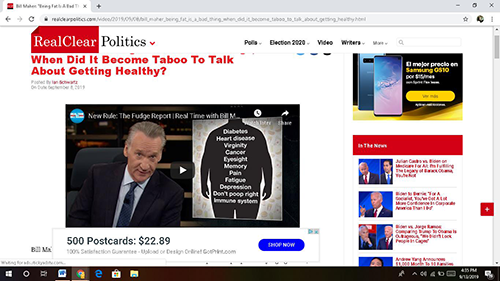During the September 6th episode of HBO’s Real Time with Bill Maher, Mr. Maher used his platform to shine a spotlight on the subject of obesity.
Unfortunately, his segment did a lot more shaming than educating. The OAC agrees that obesity does need to be a national topic, but Mr. Maher’s comments did not even scrape the surface of the conversation we should be having.
“Fat-shaming doesn’t need to end. It needs to make a comeback.” – Bill Maher
Obesity in a Different Lens
Mr. Maher did raise some interesting points. Yes, we should take obesity more seriously. Yes, it poses severe health risks and is associated with a list of harmful health conditions. The consequences don’t end there, though. People with obesity are targeted for their weight every day – at their jobs, schools, doctor’s office, in the media and more.
We don’t need fat-shaming to address obesity. We need more research and education. We need changes to our environment and healthcare system. We need more resources and tools than what is currently available. Obesity is not a personal choice or character flaw, but is instead driven by many causes:
- Genes
- Biology
- Environment
- Mental health
- And more
When Mr. Maher said that fat-shaming is the “first step to reform,” he did so believing that shame pushes people to lose weight and fix their behaviors.
However, research shows that fat-shaming doesn’t do this. If shaming worked, why are more than 93 million Americans affected by obesity when they are shamed daily? The effects of fat-shaming include depression, anxiety and poor body image. It can also lead to social rejection from peers and unhealthy attempts at weight-loss, such as eating disorders. Quite the opposite of weight-loss, fat-shaming can actually lead to weight gain.
A Better Solution than Fat Shaming
Fat-shaming is not tough love and will not improve someone’s health. Fat-shaming is bullying, and bullying of any kind is wrong.
Here is what we need to do instead:
- Recognize and end fat-shaming, weight bias and stigma
- Recognize obesity as a chronic disease
- Educate about obesity and its impacts
- Fund more research on causes, prevention and treatment
- Improve access to healthcare services and treatment
- Train healthcare providers in obesity care
- Be a voice of understanding and support
When you see obesity being discussed online, in the media or among those you know, you can share about the Obesity Action Coalition, our information and our resources. Fat-shaming is not, and will never be, an answer for how we should address obesity.

